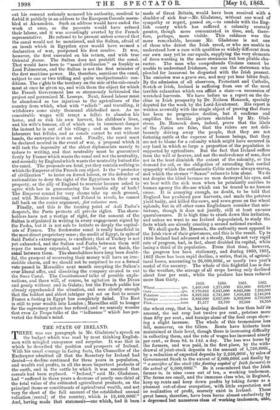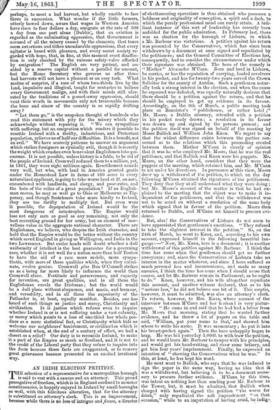THE STATE OF IRELAND. made of Great Britain would have
been received AVith a shudder of sick fear. Gladstone, without one word of sympathy or regret, passed on —to condole with the Eng- lish county which has suffered a calamity scarcely greater, though more concentrated in time, and, there- fore, perhaps, more visible. This coldness was the more remarkable because Mr. Gladstone is not one of those who detest the Irish creed, or who are unable to understand how a race with qualities so widely different from our own may yet be our equals, supplying the very elements of force wanting in the more strenuous but less pliable cha- racter. The man who comprehends Cretans cannot be unable to understand Irishmen, nor can the statesman who pleaded for lazzaroni be disgusted with the Irish peasant. The omission was a grave one, and may yet bear bitter fruit. By the admission of all observers, Protestant and Catholic, Scotch or Irish, Ireland is suffering from one of the most terrible calamities which can afflict a state—a succession of wretched harvests. We have before us a report on the de- cline in Irish prosperity by Dr. Neilson Hancock, specially deputed for the work by the Lord-Lieutenant. His report is written avowedly with the single object of proving that there has been no progressive decline, but it confirms and amplifies the terrible picture sketched by Mr. Glad- stone. Dr. Hancock does, indeed, prove that the libels of the Nation are false' that the rulers are not deli- berately driving away the people, that they are not fostering cattle at the expense of human beings, that they are not to blame for a calamity which might have occurred in any land in which so large a proportion of the population is supported by agriculture. But the fact that Ireland suffers from the will of heaven, and not the malevolence of man, does not in the least diminish the extent of the calamity, or the demand for aid, or the obligation of extending that cordial sympathy which the enthusiastic Celtic nature always craves, and which the sterner "Saxon" refuses to him alone. We do not despise the blind because no man destroyed his eyes, and. we bear with the sick man when he petulantly ascribes to human agency the disease which can be traced to no human cause. It is annoyino.° enough, no doubt, to be told that England has produced poor harvests, and made the potatoes yield badly, and killed the cows, and sown grass on the wheat uplands, but in all other eases Englishmen consider that mis- fortune, though it does not justify, still at least excuses querulousness. It is high time to crush down this irritation, and unless we want to see Ireland depopulated, to study the facts which are already creating a second national exodus.
We shall quote Dr. Hancock, the authority most opposed to the Irish view of their grievances, and this is the result. Up to 1856 Ireland had advanced at a steady, though not very rapid rate of progress, had, in fact, about doubled its capital, while losing a third of its population. From that time, however, the progress has been stationary, and during 1860, 1861, 1862 there has been rapid decline, a series, that is, of agricul- tural losses, amounting to 26,000,0001., or nearly two year's rental of the country. The whole of this frightful loss is due to the weather, the acreage of all crops having only declined about four per cent., while the produce has been reduced more than thirty.
1859. 1860. 1861. 1862. 683,048 7,283,000 2,148,204 3,792,000 24,258
the wheat crop, that is, having declined to less than half its amount, the oat crop lost twelve per cent., potatoes more than fifty per cent., and turnips alone of the food crops show- ing a slight increase. The whole of this tremendous loss fell, moreover, on the tillers. Rents have hitherto been maintained at their level, though there is increasing difficulty in collecting them, and the rate of wages has increased ninety per cent., or from 8d. to 14d. a day. The loss was borne by the farmers, and was paid, in the first place, by the with- drawal of joint-stock deposits to the amount of 1,750,000/., by a reduction of expected deposits by 2,250,000/., by sales of Government Stock to the extent of 2,000,000/. and finally by "a sacrifice of live stock (the floating capital of Irish farmers) to the extent of 6,000,000/." Be it remembered that the Irish farmer is, in nine cases out of ten, a working tradesman. The farms are small, and the immense class who, in England, keep up rents and keep down profits by taking farms as a pleasant out-of-door occupation, with little expectation and no realization of profit, scarcely exist in Ireland. These great losses, therefore, have been borne almost exclusively by a depressed but numerous class of _working tradesmen, able,
Wheat qrs. 1,468,000 1,271,000 851,000 Oats qrs. 8,170,856 8,841,000 8,045,000 Potatoes tons 4,329,523 2,741,380 1,858,433 Turnips tons 3,462,000 2,627,000 3,392,000 Flax tons 21,577 23,760 22,568
perhaps, to meet a bad harvest, but wholly unable to face three in succession. What wonder if the little farmers, utterly bowed down, aware that wages in Western America have risen to four dollars a day, emigrate at the rate of 300 a day from one port alone (Dublin), that an eviction is regarded as the culminating oppression, that Government is accused of all the misery caused by the elements, that taxes .seem extortions and tithes unendurable oppressions, that every agitator is heard with pleasure, and every secret society re- garded with hope, that, in fine, at this moment overt disaffec- tion is only checked by the ruinous safety-valve afforded by emigration? The English are very patient, and are aided by a reserve capital without a parallel for amount, tut the Home Secretary who governs us after three bad harvests will not have a pleasant or an easy task. What matter of surprise, if a race of whom two-thirds live by the land, impulsive and illogical, taught for centuries to believe -every Government malign, and with their minds still ulce- rated by the traditions of a passed-away oppression, should -vent their wrath in movements only not treasonable because the bone and sinew of the country is so rapidly drifting .away? "Let them go," is the unspoken thought of hundreds who read this statement with pity for the misery which they acknowledge without repairing it. "We can sympathize with suffering, but an emigration which renders it possible to resettle Ireland with a thrifty, industrious, and Protestant population, relieves us of half our difficulties. It is a benefit, not an evil." We have scarcely patience to answer an argument which strikes foreigners as cynically evil, though it is secretly the weight which crushes even benevolent Englishmen into qui- -escence. It is not possible, unless history is a fable, to be rid of the people of Ireland. Cromwell reduced them to a million, yet, in 1861, they were eight millions again. Resettlement sounds very well, but who, with land in America granted gratis under the Homestead Law in farms of 160 acres to every naturalized applicant, is going to take worse land at 2/. an acre, -encumbered with landlords, and clergy, and poor-rates, and the hate of the relics of a great population ? If an English- man moves, he may as well go to Ohio or Melbourne as Tip- perary, and though Scotchmen take more kindly to Ireland, they are too thrifty to multiply fast. But even were it possible, the depopulation of Ireland would be the most dangerous of catastrophes. The Empire would lose not only men as good as any remaining, not only the test recruiting ground for her army, but an element of mar- vellous value in the aggregate national character. There are Englishmen, we believe, who despise the Irish character, and hold that the Empire would be the better without the country which saved England in giving us Wellington, and India in the two Lawrences. But cooler heads will doubt whether a dull uniformity of intellect is the best guarantee for a governing race, whether it is not well for a nation more than half Teuton to have the aid of a race more mobile, more sympa- thetic, with more of those qualities which, when they culmi- nate, evolve genius. Cromwell plus Dan O'Connell strikes -us as a being far more likely to influence the world than Cromwell alone. Fortitude and perseverance, and capacity for invention, are great qualities, and in all these the Englishman excels the Irishman ; but the world would 'be a dull place without eloquence, and music, and humour, .and versatility, and in all these the superiority of the Patlander is, at least, equally manifest. Besides, one has heard of such things as justice and mercy, Christianity and civilization. Is it justice which refuses even to inquire whether Ireland is or is not suffering under a vast calamity, or mercy which points to a loss of one-third her whole pro- duce as a mere statistical fact, or Christianity which bids us welcome our neighbours' banishment, or civilization which is established when, at the end of a century of effort, we hail a 'desert as a relief? Our duty is to reconcile Ireland, to make it a part of the Empire as much as Scotland, and it is not to the credit of the Liberal party that they refuse to inquire into the !acts because those facts are exaggerated, or to remove .great grievances because presented in an excited irrational vay,































 Previous page
Previous page